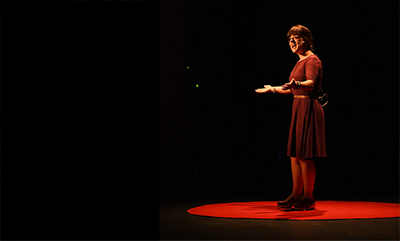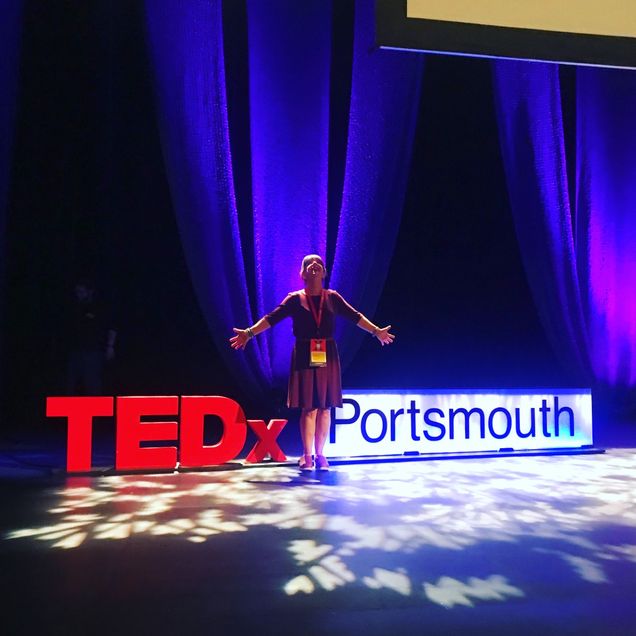‘Redefining the First Impression’.
 Five seconds.
Five seconds.
That is all the time it takes to form a first impression of someone, says School of Public Health alum Quita Christison (SPH’15). And in those brief moments, we often make snap judgements about others that lead to regrettable actions when those opinions are inaccurate.
The solution, says Christison, is right before our eyes: Whenever we encounter new people, we should take a second to STOP—as in, See the Other Person.
A youth engagement activist based in Cambridge, Mass., Christison had the opportunity to present this idea during TEDxPortsmouth, a local, independently organized spin-off of the online TED Talks, which gather speakers to share ideas about the arts, science, humanity, and entrepreneurship. The annual event took place on September 13 at the Music Hall in Portsmouth, N.H., and the talks were posted online in November.
Titled “The New 5 Second Rule: Redefining the First Impression,” Christison’s presentation has garnered almost 68,000 views in less than two months. Part of her inspiration for the nine-minute talk spurred from personal experiences she has endured throughout her life when she meets people for the first time or passes by strangers. Christison and her brother were born with pycnodysotosis (PKND), an extremely rare genetic disorder that is characterized by brittle bones and a short stature. By the time she was 18 years old, Christison had endured more than 15 surgeries to repair broken bones and on average, still breaks three to four bones each year. As far as she is aware, there are only 30 people worldwide who have been diagnosed with the disorder, including 8 in the United States.
At 4 feet 5 inches, Christison is accustomed to, but frustrated by, strangers who assume she is much younger than her actual age, at 31 years old.
“Being petite, but proportional, people always mistake me for a child because they’re not actually taking the time to look at me,” says Christison, who studied maternal and child health at SPH and now works as an outreach and engagement coordinator for NextStep, a nonprofit organization that helps severely ill youth transition to adulthood by building their own narratives and becoming their own advocates. “If people could pause for just one moment to see me for who I am, that would make a world of a difference.”
Christison acknowledges that internal biases and instant presumptions are issues that every person struggles with, to some degree.
 “I’m not here to chastise something that we all do,” Christison said during the TEDx Talk. “The human brain has an innate need to categorize—it’s how our ancestors decided if something was safe, or if we were in danger.” When someone isn’t easy for us to categorize, she says, “we stare at them. That’s how we give our brains more time to take in additional information about them, but it’s hurtful and alienating for the other person.”
“I’m not here to chastise something that we all do,” Christison said during the TEDx Talk. “The human brain has an innate need to categorize—it’s how our ancestors decided if something was safe, or if we were in danger.” When someone isn’t easy for us to categorize, she says, “we stare at them. That’s how we give our brains more time to take in additional information about them, but it’s hurtful and alienating for the other person.”
Christison embraced the acronym “STOP” to encourage people to react to new people in the same way they react to a Stop sign: pause, observe their surroundings, and provide an appropriate action. She envisions the acronym as an effective reminder to people that they can maintain control of the way they interpret their environment, form their own opinions, and react to certain situations.
“We need a tool to create a bit of space and to become aware,” Christison says in the video. She is currently working with Human Resources at Boston Medical Center, where she volunteers with children, to incorporate STOP into employee training modules.
“Every person deserves respect,” she says. “You have the power to create connection and understanding, and all it takes is five seconds.”